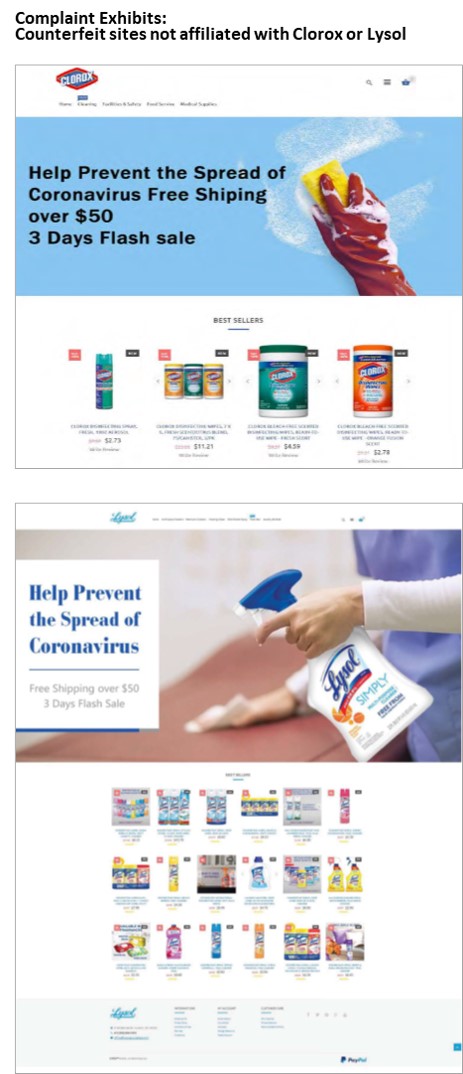For years, the FTC has warned about imposters – scammers who masquerade as government officials, financial institutions, family members, etc., in an attempt to flimflam consumers and businesses. The FTC just filed a lawsuit alleging a variation on the imposter scheme. According to the complaint, the defendants set up dozens of look-alike websites to fool people into thinking they were ordering name-brand merchandise from established national companies. The FTC says the fly-by-nighters took the money and then failed to deliver the goods. What makes their conduct particularly troubling is the nature of the brands they were impersonating. The defendants falsely claimed to sell Clorox and Lysol cleaning supplies – high-demand items during the era of COVID-19.
The defendants allegedly used search engine marketing, social media, and pop-ups to lure consumers to sites designed to create the false impression that the sellers are – or are affiliated with – the makers of Clorox and Lysol products. Adding to the bogus air of authenticity were the use of those companies’ logos and look-alike URLs – cloroxstore.com, clorox-sales.com, lysol-wipe.com, and lysol-clean.com, to mention just a few of the 25 counterfeit sites.
 According to the FTC, consumers never received the products they ordered and paid for through the defendants’ sites. The lawsuit alleges that consumers’ post-purchase experience was similarly frustrating. Some tried to check on the status of their orders by calling or emailing the defendants, but got no response. Others received communications from the defendants with falsified delivery information about purported shipments that never arrived. Still others received merchandise from the defendants, but it was never the cleaning products they ordered.
According to the FTC, consumers never received the products they ordered and paid for through the defendants’ sites. The lawsuit alleges that consumers’ post-purchase experience was similarly frustrating. Some tried to check on the status of their orders by calling or emailing the defendants, but got no response. Others received communications from the defendants with falsified delivery information about purported shipments that never arrived. Still others received merchandise from the defendants, but it was never the cleaning products they ordered.
In addition, consumers who tried to return to the website where they had made the purchase often learned they had been ghosted. The defendants would periodically shut down a particular site only to reopen with a different deceptive URL. When exasperated buyers tried to get chargebacks through their credit cards or other payment methods, the FTC says the defendants remained true to their scheming ways, proffering phony shipment information in an effort to thwart refund requests.
The complaint alleges the defendants violated the FTC Act by falsely claiming an affiliation with the companies that make Clorox and Lysol products and by falsely representing they would deliver the products people ordered. The FTC also charges that they violated the Mail, Internet, or Telephone Order Rule. A federal court in Ohio has issued a temporary restraining order, but even at this early stage, the case offers tips for businesses when buying and selling.
When sourcing supplies, consider the risks of buying “site” unseen. Do your research before ordering from unknown websites. That evergreen advice applies particularly in times of product shortages. Finding a site that just happens to sell must-have items that are out of stock everywhere else could mean one of two things. Either today’s your lucky day or you’ve stumbled on a faux-ny webpage designed to fool the eye and open the wallet. One informal investigative technique: Search for the URL or company name with terms like “complaint” or “scam.”
Follow the Mail Order Rule to keep your orders in order. Some companies take orders with no intention of fulfilling them. That conduct can result in law enforcement action under both the FTC Act and the Mail, Internet, or Telephone Order Rule. Other companies run into unanticipated supply chain delays. The good news for those businesses is that the Mail Order Rule makes it easy to stay within the law. Contact your customers, ask if they want a refund or if they’re willing to wait, and honor their preferences. Read the FTC’s Business Guide to the FTC's Mail, Internet, or Telephone Order Merchandise Rule for sensible steps to address unanticipated shipment delays.
